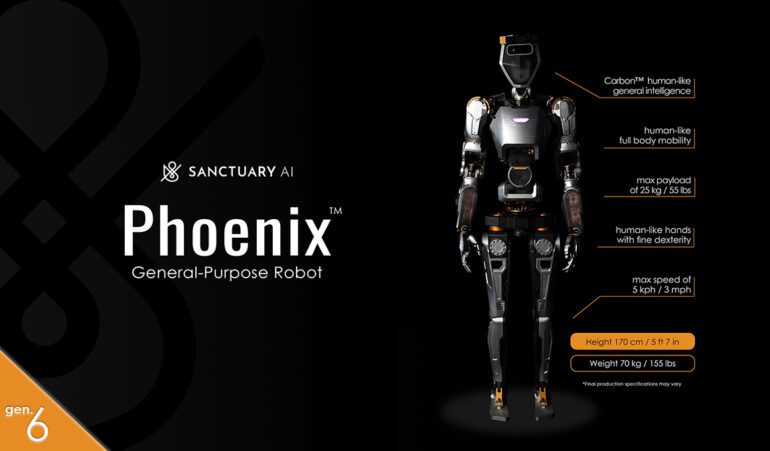TL;DR:
- Vancouver-based company unveils Phoenix, a bipedal robot standing 5’7″ and weighing 155 pounds.
- Phoenix is designed to augment or potentially replace humans with a lifting capacity of 55 pounds and a speed of three miles per hour.
- The robot features complex hands with 20 degrees of freedom and proprietary haptic technology for human-like dexterity and touch.
- A predecessor of Phoenix was successfully tested in a retail store, completing 110 tasks, including merchandise handling, cleaning, and labeling.
- Building a general-purpose robot that can perform various tasks is a challenge, but Phoenix aims to be the most capable humanoid ever built.
- CEO Geordie Rose envisions a future where general-purpose robots are as ubiquitous as cars, assisting in tasks where human labor is insufficient.
Main AI News:
The Vancouver-based company has recently introduced its own groundbreaking creation, Phoenix, taking the form of a bipedal robot. Standing tall at 5’7″ and weighing 155 pounds, this innovative marvel closely resembles its human counterparts, perhaps even rivaling them in the near future. As an augmentation or a potential replacement, depending on one’s perspective, Phoenix possesses remarkable capabilities. With the ability to lift payloads up to 55 pounds and traverse at a speed of three miles per hour, this advanced system is primed for an array of tasks.
One notable feature of Phoenix lies in its complex hands, equipped with an impressive 20 degrees of freedom. These hands possess a dexterity and precision comparable to that of the human hand, thanks to proprietary haptic technology, which expertly mimics the delicate sense of touch. The level of fine manipulation achievable by this state-of-the-art design is truly unparalleled.
In March, the company made waves by unveiling Phoenix’s predecessor during a limited pilot program at Mark’s retail store located outside of its native Vancouver. Over the course of a week, the fifth-generation system exhibited its capabilities by flawlessly executing an impressive range of 110 retail-related tasks. From front and back-of-store activities such as merchandise picking and packing to cleaning, tagging, labeling, and folding, the robot performed with remarkable efficiency.
However, the true challenge in creating humanoid robots lies not only in their physical construction but in their ability to adapt to a variety of tasks. The concept of a “general-purpose” robot, one that can hypothetically perform any task its human counterparts can, presents an intricate obstacle. It requires a level of intelligence and versatility that surpasses mere hardware construction.
Geordie Rose, the co-founder and CEO, shares his insights on the revolutionary design of Phoenix, emphasizing its rich array of sensors and unparalleled physical capabilities. Rose envisions a future where general-purpose robots, much like cars, become an integral part of our daily lives. They will play a crucial role in accomplishing tasks that require attention and effort, especially in situations where the human workforce falls short.
With Phoenix leading the charge, Carbon Robotics aims to shape a future where robotic assistance is as commonplace as the vehicles we rely on. By harnessing the power of technology and enabling intelligent automation, the company is paving the way for a world where there will always be a helping hand, even in the face of labor shortages.
Conlcusion:
The introduction of Phoenix, a highly advanced humanoid robot with exceptional physical capabilities and versatile applications, signifies a significant development in the market. This innovation has the potential to revolutionize various industries by providing a reliable and adaptable solution to labor-intensive tasks. With its sensor-rich design and the ability to mimic human hand dexterity, Phoenix represents a major leap forward in automation technology.
As the demand for efficient and cost-effective solutions increases, the market for general-purpose robots is poised for substantial growth. Businesses that embrace and integrate such advanced robotics systems into their operations stand to gain a competitive edge, streamlining processes, enhancing productivity, and addressing labor shortages effectively. The future holds tremendous opportunities for industries to leverage the power of robots like Phoenix to accomplish a broader range of work tasks, ultimately reshaping the landscape of the market.

